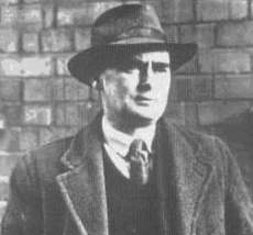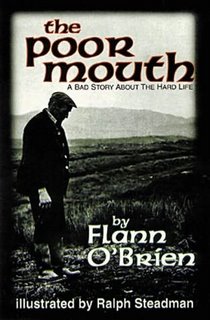As you can see from the header above the title of this blog comes from a Gaelic expression "putting on the poor mouth" which means to exaggerate the direness of one's situation in order to gain time or favour from creditors. It can also simply mean grumbling (which I suppose is apt given the content of this blog...)
But why choose such an expression? I did so because I love the expression but also as a tribute to one of my favourite authors the late, great Irish novelist/humorist/civil servant, Flann O Brien. (Aka Brian O Nolan, aka Myles na gCopaleen).
The Poor Mouth was originally published as An Beal Bocht in 1941, the only one of his novels to be written in Gaelic. It only appeared in English translation for the first time in 1973 – seven years after his death. I would have called the blog An Beal Bocht but someone had beaten me to that name
The Poor Mouth is set in the fictional village of Corkadoragha, a place which knows suffering an poverty in spades, It is a place were the torrential rains are more torrential, the squalor more squalid, the hopelessness more utterly hopeless than they are anywhere else in Ireland.
It is the story of Bonaparte O'Coonassa who, like the other characters spends the bulk of his time lamenting the fate of the Gaels whose lot it is to live a hard, miserable life. But it is certainly not a miserable book. It is very readable and very, very funny!
It is a wonderful tale in which you learn about being a child of the ashes, Ambrose a pig the size of a house, Sitric O Sanassa (the excellence of his poverty was without comparison in all of Ireland) and the awful Sea Cat a harbinger of misfortune that looks uncannily like the island of Ireland. You also discover the origin of the name Jams O’ Donnell (see my previous post Why Jams O Donnell? ) and why when an Irish person says calls you sir they could be insulting you!
O’Brien actually wrote the Poor Mouth as a parody of Irish literature such as Tomás O’Criomhthainn, whose work dwelt very much on the hardship of Gaelic life. In addition it was intended as a swipe at the patronising attitude of “Irish Irelanders” towards rural Gaelic speakers –as evidenced in one glorious scene where Gaelic enthusiasts mistake the grunting of a pig for melodious Irish simply because they cannot understand it! Needless to say it caused a storm when it was published.
Even if you have never heard of Tomas O Criomhtnainn and couldn’t care less about the attitude urban Gaelic enthusiasts towards the residents of the Gaeltacht, the Poor Mouth is a wonderful read. I would stongly recommend you find a copy of the book as its likes will certainly never be there again!
Further Reading
Gaelically Gaelic by Eric Mader-Lin (From Necessary Prose)
Flann O’Brien: A Postmodernist When It Was Neither Profitable Nor Popular by Robert Looby (At the Scriptorium website)
The No Bicycle Page
Flann O'Brien Poor Mouth


6 comments:
"A postmodernist when it was neither profitable nor popular"
What a brilliant title. How could anyone who had read his newspaper columns resist it?
Absolutely right Skuds! It's a great title. The Cuiskeen Lawn articles could be wonderful.
I noticed that there was a musician called jamsodonnell, mullet. Definitely must find out what the jamsodonnell sound is like.
I've used the "poor mouth", a few times in my life.
I tend to used the "potty mouth" myself!
Looking for a pic of the Sea-Cat, finding none on the Net, but blogging on ye with thanks to the spirit of your titular scribe.
Thanks for the link!
Post a Comment